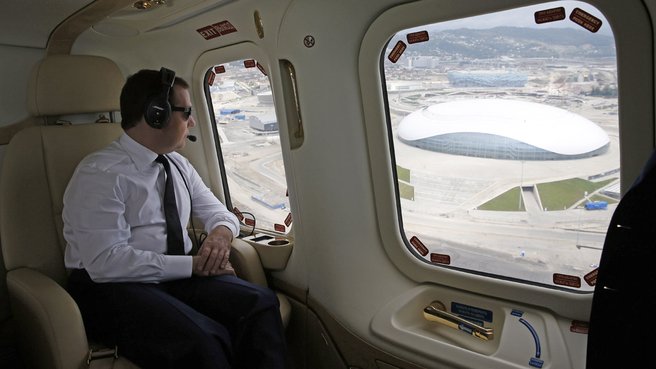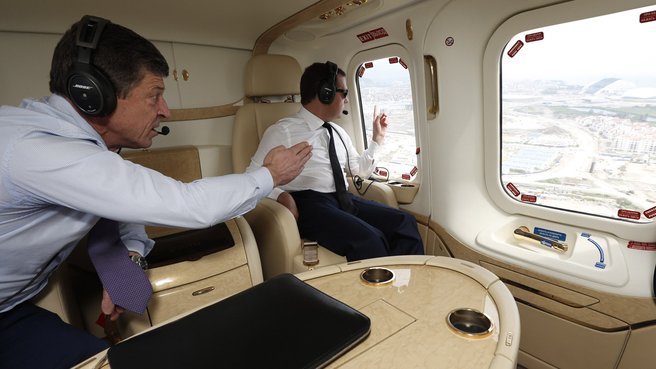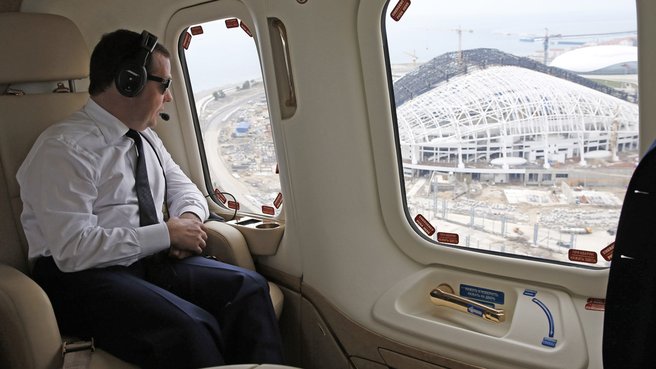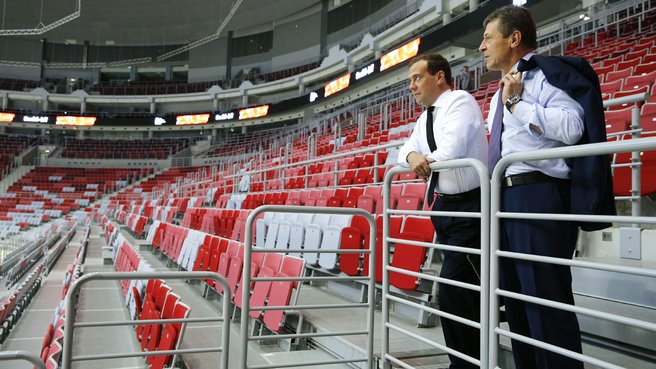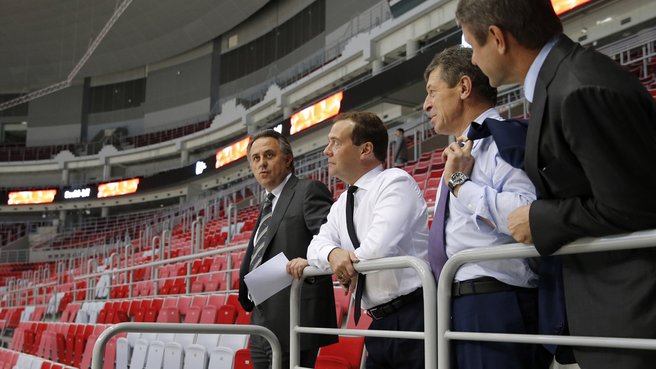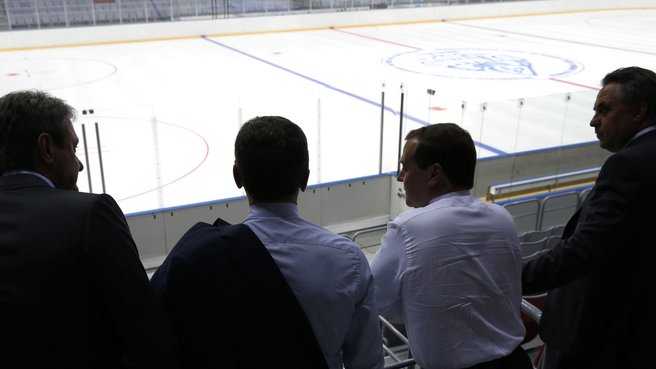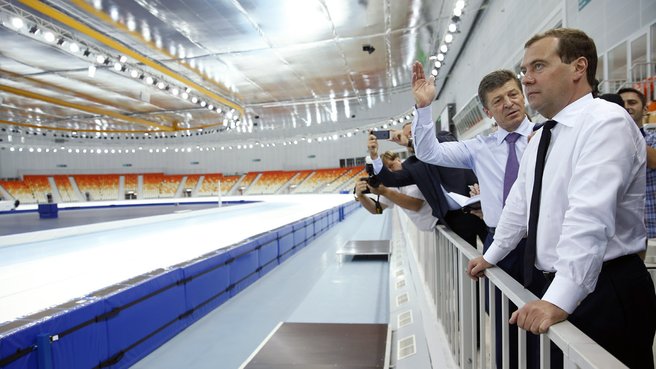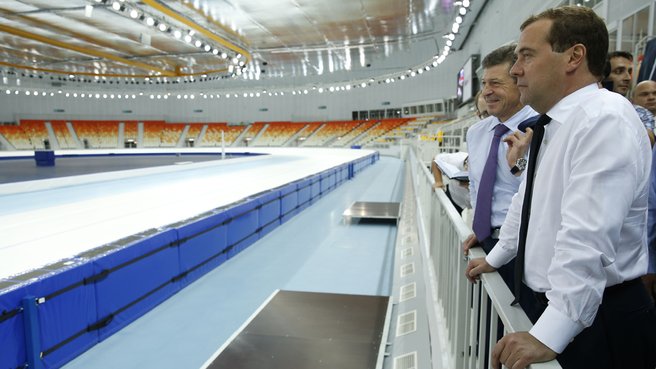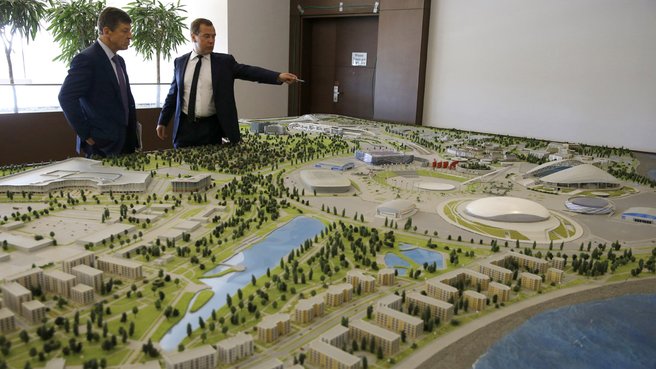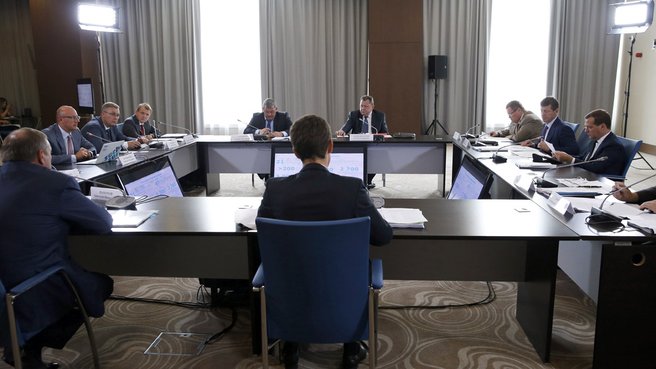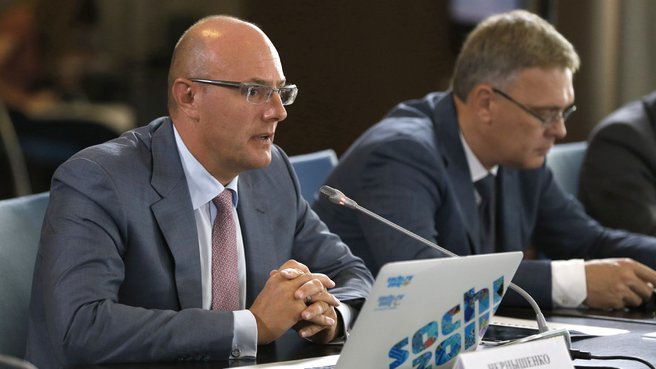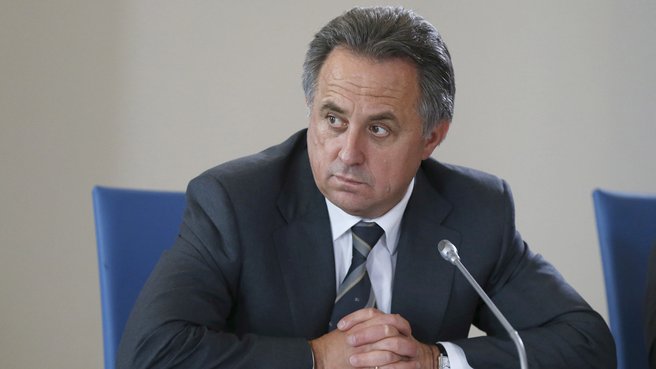Dmitry Medvedev visits Olympic Park in Sochi.
Aerial review of Olympic Park from a helicopter
Mr Medvedev visited the recently opened Bolshoy Ice Dome that has already hosted several sport competitions, including international events. The venue will also host the Sochi 2013 International Investment Forum in September. The Prime Minister reviewed a panoramic photo of Olympic Park construction displayed in the hall.
The Prime Minister also visited the Adler Arena Skating Centre that has also already been used for sporting events. Medvedev saw a section of the future Formula 1 track that can be seen from the Adler Arena.
Later, Dmitry Medvedev visited the construction site of the Apart Hotel that will accommodate journalists during the Olympic Games.
The Bolshoy Ice Dome in the Imereti Valley was opened on January 14, 2013, for ice hockey competitions. The facility has a total area of 96,000 sq m and can hold up to 12,000 spectators. The building cost 9.6 billion roubles.
Several sport and cultural events have already been held at the Bolshoy Ice Dome, including:
- The one year countdown to the Sochi Olympics opening ceremony on February 7, 2013;
- The World Junior Ice Hockey Championships on April 17-29, 2013;
Related information
- The final stage of the Second Russian Non-Professional Ice Hockey Festival of the Night Ice Hockey League;
The Bolshoy will host the Dynamo Cup Ice Hockey Championships on August 15-16, 2013, and the convention of players and coaches of the Russian national ice hockey team on August 23-24, 2013.
The venue will host the Sochi 2013 International Investment Forum on September 26-29, 2013;
After the Olympic Games, the Bolshoy Ice Dome will be used as a multi-purpose sport centre.
Dmitry Medvedev’s introductory remark:
Meeting on Preparations for the 2014 XXII Winter Olympic and the XI Paralympic Games
We are meeting here to discuss the preparations for the Sochi Winter Olympics. This is a topic that the Government deals with on a regular basis, but first of all, I would like Dmitry Kozak (Deputy Prime Minister) and some other members of the Government to pay attention to the situation that has developed in the Far East, in particular, the Amur Region, in the city of Blagoveshchensk. I just spoke to the Minister of Emergencies, he is on the site. Obviously we should develop some special support measures to provide help. Some of the local residents have lost their homes, they have been evacuated. There are also issues relating to the food supplies and the situation on the Zeya reservoir. So, I would like you, Mr Kozak, to discuss all these issues with Blagoveshchensk Governor Oleg Kozhemyako (I also spoke with him) and with the Minister of Emergencies. The Defence Ministry is also involved in the relief actions. It is necessary to evaluate the damage, think about what else can be done to improve the situation and closely monitor the developments. Now the weather remains bad there, and heavy rains are likely to continue. So, we should keep the situation under control, paying special attention to the residents, test the warning systems, and in dangerous cases make timely decisions on evacuating people. That is what I wanted to say to start off.
Now back to the Olympics. It is half a year until the Olympics; in fact, we are on the final stretch. Most sports facilities are already built, a series of national and international test competitions (about 70) have been held. We have visited Olympic facilities; on the whole they appear to be almost completed, some of them are still being constructed, but in general, the level of completion is quite high.
Now we have to attend to organisational issues connected with the infrastructure and the hosting of the Games, as well as reception of athletes and visitors; we must comply with the plan of events. Despite being on the final stretch (there is just half a year left), the issue of the completion of facilities is still topical. We should monitor the completion, using both incentives and penalties in those cases when contractors and organisations responsible for the premises break the deadlines and conditions stipulated by the contract. We have both positive examples, such as hotel construction, which we have just discussed, and not so positive ones. However, everything must be completed, as the deadline is approaching. This concerns the transportation infrastructure, communication facilities and new generating capacities. All the remaining issues should be settled, and, of course, all the facilities commissioned should be of a high quality.
Dmitry Medvedev: "Our objective is to do our best to make Sochi comfortable and safe for visitors, and services offered to visitors should meet the highest standards."
The second topic is preparing Sochi for the Games. We should think out all the details, from accommodation to a cultural programme; check the readiness of the housing and public utilities, retail trade and catering enterprises, as many of them are under renovation. Particular attention should be paid to security issues and to providing interaction between emergency services and medical aid.
Of course, our objective is to do our best to make Sochi comfortable and safe for visitors, and services offered to visitors should meet the highest standards. I know the Olympic staff is being trained and certified; tens of thousands of volunteers have been selected. Of course, the visitors’ mood, their impression of the Games, of Sochi and of our country in general will depend on their work and interaction between services.
We must definitely use the experience of the Summer World University Games in Kazan, in terms of the organisation of competitions, as well as the work of transport, energy systems, the entire hospitality infrastructure. Everything ran at the highest level there. I can testify to that, as I visited a number of facilities there, talking to volunteers, athletes, and residents. I believe we should provide the same high level of organisation in Sochi. I hope that all positive aspects of the University Games in Kazan will be taken into account in Sochi.
And, finally, as regards certain proposals by the respective ministries and departments. I think we will discuss them and make necessary conclusions, and necessary instructions will be given.
Now let’s move on to current issues.
